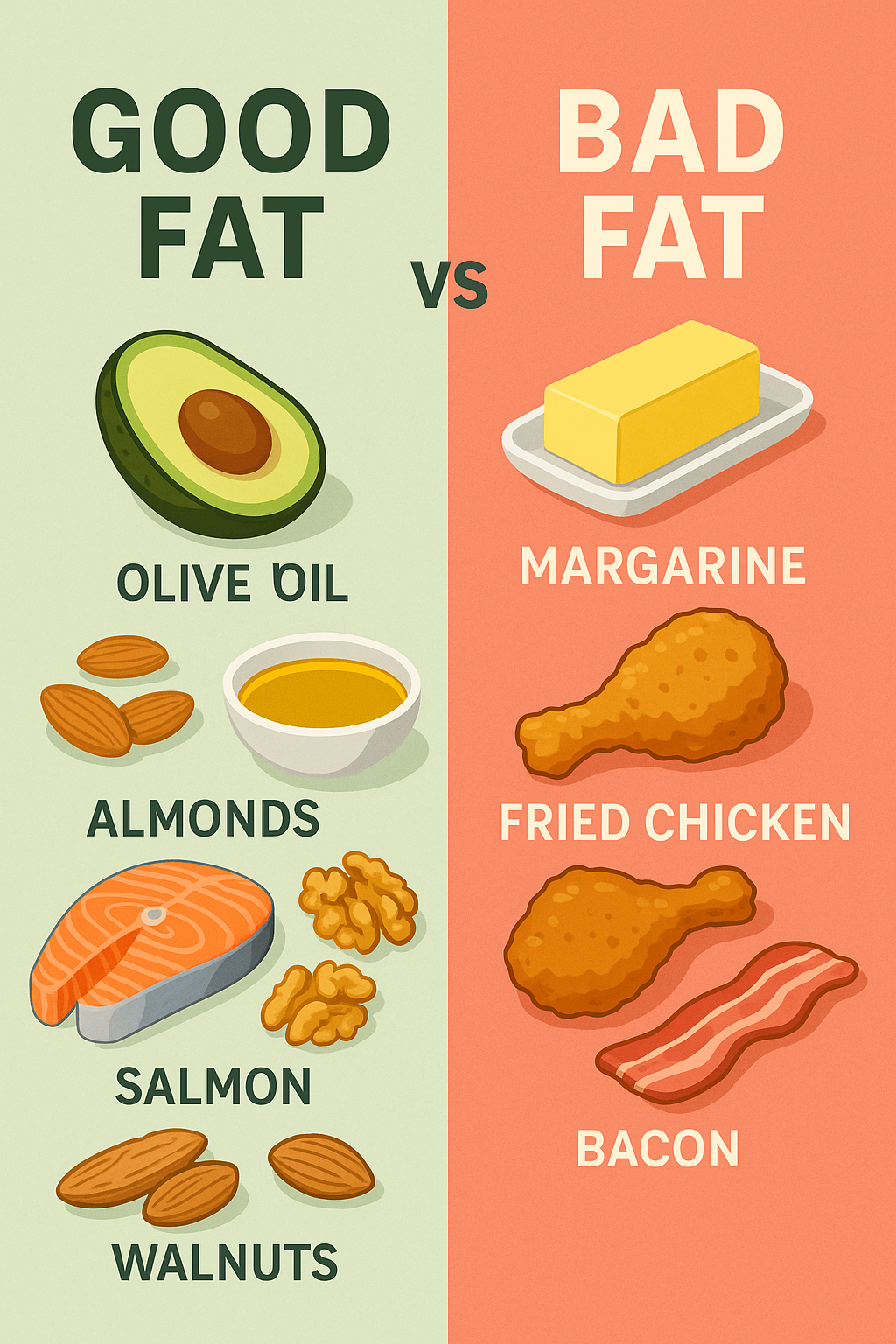“Not all fats are created equal — some heal, others harm. The secret is knowing which is which.”
The Fat Confusion
For decades, “fat” was the villain of the diet world. Supermarket shelves filled with “low-fat” and “fat-free” labels, while butter and avocado were demonized alike. But science has changed the conversation.
The truth? Your body needs fat — for energy, hormone production, brain health, and even absorbing vitamins. The key is choosing the right kind of fat.
Meet the Good Fats
1. Monounsaturated Fats
💡 Why they’re good: Help lower bad cholesterol (LDL) and protect the heart.
Sources: Olive oil, avocados, almonds, cashews, peanuts.
2. Polyunsaturated Fats
💡 Why they’re good: Provide essential omega-3 and omega-6 fatty acids your body can’t make.
Sources: Salmon, mackerel, walnuts, sunflower seeds, flaxseeds.
3. Omega-3 Fatty Acids (The Superstar)
💡 Why they’re good: Reduce inflammation, support brain health, and lower heart disease risk.
Sources: Fatty fish, chia seeds, hemp seeds, algae oil.
Quick Tip: Swap butter for extra-virgin olive oil in cooking, or sprinkle chia seeds on breakfast bowls.
The Bad Fats You Should Avoid
1. Trans Fats (The Worst Offender)
🚫 Why they’re bad: Raise LDL cholesterol, lower HDL cholesterol, increase inflammation, and boost heart disease risk.
Sources: Hydrogenated oils, many margarines, packaged snacks, fried fast food.
2. Excess Saturated Fat
🚫 Why they can be bad: In moderation, saturated fats aren’t harmful for everyone, but excess intake may raise cholesterol and clog arteries.
Sources: Fatty cuts of meat, processed meats (sausages, bacon), full-fat dairy, coconut oil.
Quick Tip: If you eat meat, choose lean cuts and balance with plant-based fats.
Why Fat Matters for More Than Just Weight (Agent: Story Layering & Emotional Resonance)
- Brain Power: 60% of your brain is fat — starving it of healthy fats can impair memory and focus.
- Hormone Balance: Healthy fats regulate hormones like estrogen, testosterone, and cortisol.
- Vitamin Absorption: Vitamins A, D, E, and K need fat to be absorbed effectively.
Cultural Connection
Mediterranean diets rich in olive oil, nuts, and fish are linked to longer life expectancy and lower chronic disease rates. On the other hand, Western diets high in fried and processed foods show the opposite trend.
Hidden Gems
- Ghee, used in Indian cooking, is rich in fat-soluble vitamins and, in moderation, can be part of a healthy diet.
- Dark chocolate (70%+ cocoa) contains healthy fats and antioxidants.
Curiosity Gap
- Could modern omega-3-rich diets reduce depression rates globally?
- Is the fear of saturated fat overblown in active, healthy individuals?
Practical Fat-Smart Swaps
❌ Margarine → ✅ Olive oil spread
❌ Potato chips → ✅ Raw nuts
❌ Fried chicken → ✅ Oven-baked salmon
❌ Cream-based sauces → ✅ Avocado-based dressings
Why It Matters
Fats aren’t the enemy — ignorance is. By choosing the right fats, you fuel your body, protect your heart, and sharpen your mind.
Conclusion: An Optimist’s Perspective
Eating well doesn’t mean avoiding fat — it means embracing the right ones. Good fats heal, energize, and empower. The future of health isn’t low-fat; it’s smart fat.

